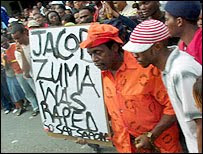I don't know whether everyone who blogs on this blog will support the below statement but I know I do and I am relatively certain that it reflects the view of everyone.
Bloggers For a Free Press
Last week, shocking revelations concerning the activities of the ANC Youth League spokesperson Nyiko Floyd Shivambu came to the fore. According to a letter published in various news outlets, a complaint was laid by 19 political journalists with the Secretary General of the ANC, against Shivambu. This complaint letter detailed attempts by Shivambu to leak a dossier to certain journalists, purporting to expose the money laundering practices of Dumisani Lubisi, a journalist at the City Press. The letter also detailed the intimidation that followed when these journalists refused to publish these revelations. We condemn in the strongest possible terms the reprisals against journalists by Shivambu. His actions constitute a blatant attack on media freedom and a grave infringement on Constitutional rights. It is a disturbing step towards dictatorial rule in South Africa.
We call on the ANC and the ANC Youth League to distance themselves from the actions of Shivambu. The media have, time and again, been a vital democratic safeguard by exposing the actions of individuals who have abused their positions of power for personal and political gain.
The press have played a vital role in the liberation struggle, operating under difficult and often dangerous conditions to document some of the most crucial moments in the struggle against apartheid. It is therefore distressing to note that certain people within the ruling party are willing to maliciously target journalists by invading their privacy and threatening their colleagues in a bid to silence them in their legitimate work.
We also note the breathtaking hubris displayed by Shivambu and the ANC Youth League President Julius Malema in their response to the letter of complaint. Shivambu and Malema clearly have no respect for the media and the rights afforded to the media by the Constitution of South Africa. Such a response serves only to reinforce the position that the motive for leaking the so-called dossier was not a legitimate concern, but a insolent effort to
intimidate and bully a journalist who had exposed embarrassing information about the Youth League President.
We urge the ANC as a whole to reaffirm its commitment to media freedom and other Constitutional rights we enjoy as a country.
Blog Roll:
http://thoughtleader.co.za/siphohlongwane
http://rwrant.co.za
http://vocfm.co.za/blogs/munadia/
http://vocfm.co.za/blogs/shafiqmorton/
http://blogs.news24.com/needpoint
http://capetowngirl.co.za
http://thoughtleader.co.za/sentletsediakanyo
http://thoughtleader.co.za/davidjsmith
http://letterdash.com/one-eye-only
http://boyuninterrupted.blogspot.com
http://amandasevasti.com
http://blog.empyrean.co.za/
http://letterdash.com/brencro
http://6000.co.za
http://chrisroper.co.za
http://pieftw.com
http://hamishpillay.wordpress.com
http://memoirs4kimya.blogspot.com
http://thoughtleader.co.za/azadessa
http://watkykjy.co.za
http://fredhatman.co.za
http://thelifeanddeathchronicles.blogspot.com/
http://blogs.timeslive.co.za/common-dialogue/
http://www.clivesimpkins.blogs.com/
http://mashadutoit.wordpress.com
http://nicharalambous.com
http://sarocks.co.za
http://blogs.timeslive.co.za/stompies/
http://helenmoffett.book.co.za/blog/
http://01universe.blogspot.com
http://groundwork.worpress.com
http://iwrotethisforyou.me
http://fionasnyckers.book.co.za
http://attentiontodetail.wordpress.com
http://blogs.women24.com/editor
http://www.missmillib.blogspot.com
http://snowgoose.co.za
http://dreamfoundry.co.za
http://www.vanoodle.blogspot.com
http://www.exmi.co.za/.co.za
http://cat-dubai.blogspot.com
http://alistairfairweather.com
http://www.zanedickens.com
http://www.nickhuntdavis.com
http://guysa.blogspot.com
http://book.co.za
http://baldy.co.za
http://skinnylaminx.com
http://blogs.african-writing.com/zukiswa
http://www.mielie.wordpress.com
http://blogs.timeslive.co.za/gatherer/
http://thoughtleader.co.za/sarahbritten
http://stii.co.za
http://blogs.news24.com/FSB_AP
http://twistedkoeksuster.blogspot.com
http://whensmokegetsinyoureyes.blogspot.com/
http://trinklebean.wordpress.com
http://commentry.wordpress.com/
http://matthewbuckland.com
http://blogs.news24.com/colour-me-fran
http://gormendizer.co.za
http://forvoetssake.blogspot.com













